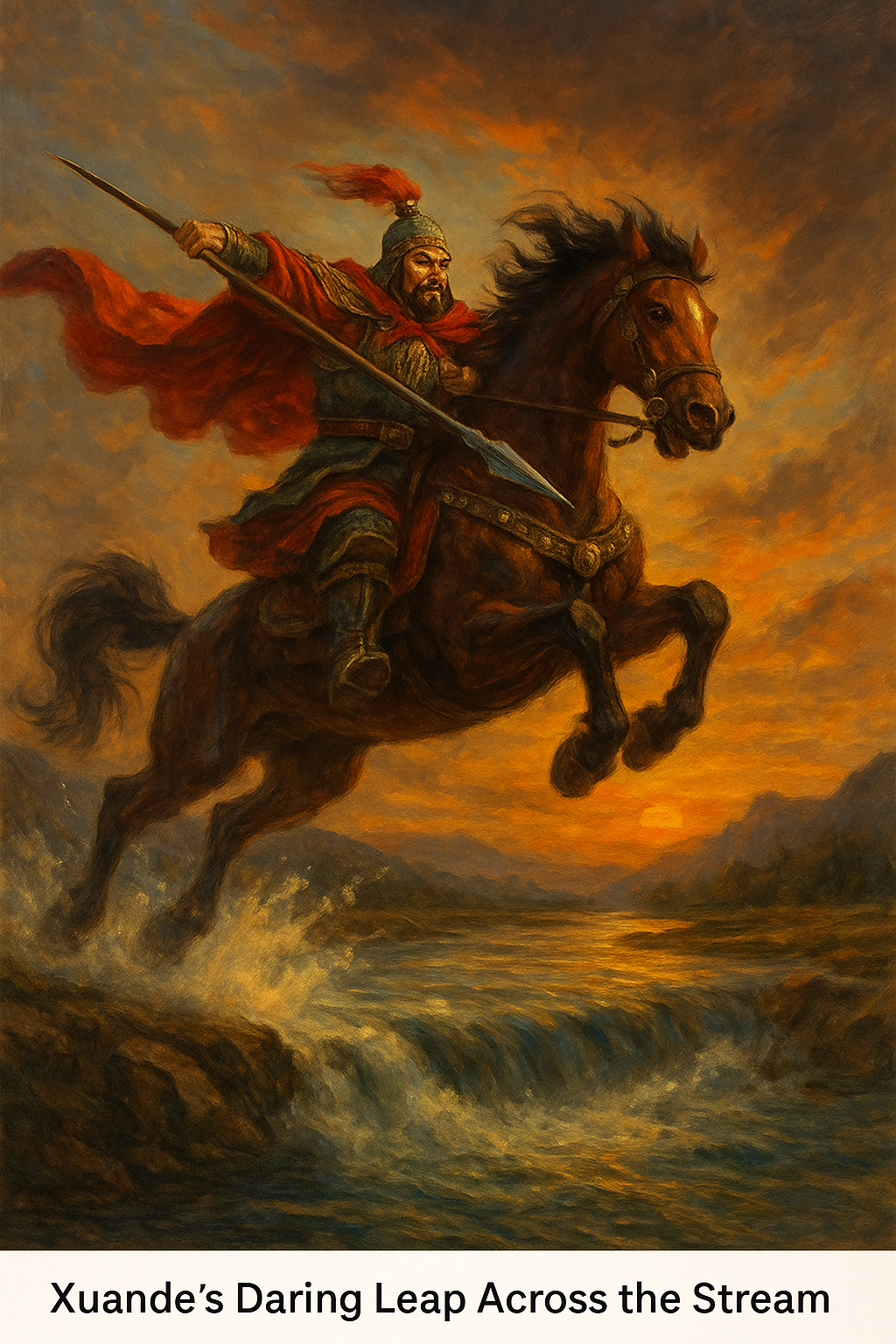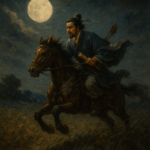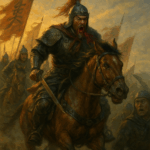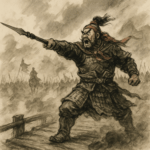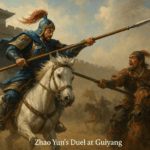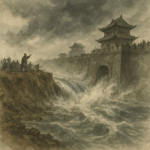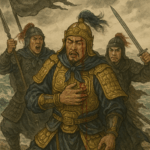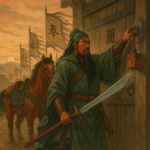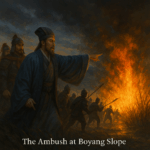Cai Mao intended to return to the city, and Zhao Yun led his troops out through the gate in pursuit. Zhao Yun had been drinking when he suddenly saw the stir of men and horses. Rushing inside, he found that Xuande was gone from the banquet hall. Alarmed, he dashed to the garrison quarters and learned, “Cai Mao has led his troops westward.” Seizing his spear, he mounted, gathered the three hundred soldiers he’d brought, and charged through the west gate. He soon overtook Cai Mao and urgently asked, “Where is our lord?” Cai Mao replied, “He fled the banquet hall without warning—I know not his destination.” Ever cautious, Zhao Yun pressed on. In the distance he spied a wide stream blocking the road and turned back to confront Cai Mao: “You invited our lord to this feast—why did you bring your troops in pursuit?” Cai Mao answered, “Officials from nine commanderies and forty-two counties are gathered here. As commanding general, I must ensure security.” Yun demanded, “Where did you force him to go?” Cai Mao said, “I saw him ride out the west gate—but beyond here, no trace.” Doubt filled Yun’s mind. He rode to the streambank and saw horse-tracks vanish into the water. He thought, “Could the horse have leapt the stream?” He ordered his men to search but found nothing. When he returned, Cai Mao had already re-entered the city. Guards only repeated, “Master Liu Xuande sped westward on horseback.” Fearing an ambush if he entered the city, Yun reluctantly led his men back to Xinye.
Meanwhile, Xuande spurred his horse across the stream, staggering with excitement as though drunk. “No obstacle too wide to leap—could this not be Heaven’s will?” he thought. Riding south toward Nanzhang as the sun dipped low, he came upon a shepherd boy perched on an ox’s back, playing a short bamboo flute. Xuande sighed, “I am outdone!” and halted to watch. The boy stopped, studied Xuande, and said, “General, could you be Liu Xuande who routed the Yellow Turbans?” Startled, Xuande asked, “You are but a village child—how do you know my name?” The boy replied, “I often accompany my master, and his guests spoke of Liu Xuande: seven feet five inches tall, sleeves brushing his knees, a countenance that commands respect. Now I see you, and it must be you.” Xuande inquired, “Who is your master?” The boy said, “His surname is Sima, given name Hui, styled Dezhao, from Yingchuan—known as Water Mirror.” Xuande asked, “Who are his friends?” The boy answered, “He is close to Lord Pang of Xiangyang and Pang Tong.” Xuande asked further, “Pang of Xiangyang—how is he related to Pang Tong?” The boy said, “They are uncle and nephew: Lord Pang, styled Shanmin, is ten years older than my master; Pang Tong, styled Shiyuan, is five years younger. One day my master was gathering mulberries when Pang Tong came to visit. They discussed statecraft under a tree all day, my master calling him brother.” Xuande asked, “Where does your master live now?” The boy pointed ahead: “In the woods lies his villa.” Xuande said, “I am Liu Xuande—please lead me to pay my respects.”
After more than two miles, they arrived at the estate. Dismounting at the gate, they heard an exquisite qin melody drifting from within. Xuande motioned to the boy to pause. The music suddenly stopped, and a man laughed as he emerged: “Such pure, secluded tones, yet so boldly raised—a hero must be eavesdropping.” The boy said, pointing to Xuande, “This is my master, Water Mirror.” Xuande saw a tall, slender figure—noble as pine and crane. Hastily, Xuande bowed, his robe damp with sweat. Water Mirror said, “Today you have narrowly escaped great peril!” Xuande, astonished, could only bow his thanks. The boy added, “He is Liu Xuande.” Water Mirror invited him into the thatched hall. Shelves were piled high with books, bamboo and pines flourished outside, and the qin rested on a stone bench, its clear fragrance lingering. Water Mirror asked, “From where do you come?” Xuande replied, “I passed by and was guided here. To see your venerable countenance is my good fortune.” Water Mirror smiled, “You need not hide anything—you must have fled here in adversity.” Xuande recounted Xiangyang’s events. Water Mirror said, “By your demeanor I perceived as much.” Then he asked, “I have long heard of your great name. Why do you wander in hardship?” Xuande said, “My path has been fraught with obstacles.” Water Mirror said, “Not so—simply you have not found the right supporters.”
Xuande said, “Though I lack talent, I have Sun Qian, Mi Zhu, Jian Yong in letters, and Guan Yu, Zhang Fei, Zhao Yun in arms, all loyal and capable.” Water Mirror said, “Guan, Zhang, and Zhao Yun each face ten thousand enemies alone—yet you lack a conductor for their talents. Sun Qian and Mi Zhu are pale scholars, unfit for statecraft.” Xuande replied, “I too sought recluses in the mountains and valleys, but none answered.” Water Mirror asked, “Have you heard the children’s ballad in Jing and Xiang? ‘In the eighth and ninth years the decline began; by the thirteenth no survivors remained. Then by Heaven’s decree the dragon buried in mud soars to the sky.’ It began in early Jian’an: Year Eight saw chaos in Liu Jing’s house, thus decline; no survivors foretold Jing’s downfall and the scattering of his officers; the dragon soaring to the sky refers to you.” Xuande, shocked, bowed: “How dare I match such words!” Water Mirror said, “Today’s extraordinary talents are here—you must seek them.” Xuande hurried, “Who are these talents?” Water Mirror said, “The Crouching Dragon and the Young Phoenix—secure but one, and you may restore the realm.” Xuande asked, “Who are they?” Water Mirror clapped and laughed: “Good! Good!” But pressed further, he only said, “It grows late—rest here tonight, and tomorrow I will tell you.” He ordered food and drink served, and the horses taken to the back garden. Xuande ate and slept beside the hall.
Unable to sleep, he pondered Water Mirror’s words until deep in the night he heard a knock. Water Mirror said, “What news from Pang Degong?” Xuande rose and listened to a voice reply, “I came to pay respects to Liu Jing, known to reward virtue and punish vice. Yet I found empty reputation—he rewards the virtuous but does not employ them, punishes the wicked but does not remove them. I wrote a letter of farewell and came here.” Water Mirror said, “You have the talent to serve a king—why risk seeking Jing when heroes stand before you unrecognized?” The man said, “You speak truly.” Xuande sensed this visitor was one of the foretold talents but hesitated to rush forward.
At dawn, Xuande asked Water Mirror, “Who was last night’s guest?” Water Mirror said, “A friend of mine.” Xuande pressed for his name. Water Mirror only laughed, “Good! Good!” Xuande again asked, “The Crouching Dragon and Young Phoenix—who are they?” Water Mirror laughed, “Good! Good!” Xuande entreated him to leave the mountains and assist him. Water Mirror said, “My hermit’s life is unfit for service—one far greater than I will come.” As they spoke, a horse neighed outside. The boy reported, “A general has arrived with several hundred men.” Xuande leaped up and saw Zhao Yun. Overjoyed, he welcomed him into the hall. Yun said, “I searched all night—you must return quickly, for enemies may attack the county.” Xuande bade Water Mirror farewell and, mounting with Yun, rode for Xinye. After a few miles, they met Guan Yu and Zhang Fei. All rejoiced and recounted Xuande’s miraculous leap across the stream.
Back in the county, they consulted Sun Qian. He advised, “First send a letter to Liu Jing, explaining what happened.” Xuande agreed and dispatched Sun Qian with the letter. Jing summoned Xuande and asked, “I invited you to Xiangyang—why did you flee the banquet?” Sun Qian presented the letter and explained Cai Mao’s plot and Xuande’s escape. Jing, enraged, summoned Cai Mao and rebuked him: “How dare you harm my brother!” He ordered Cai Mao executed. Lady Cai begged for mercy, but Jing’s anger remained. Sun Qian warned, “If you kill him, the prince may lack peace here.” Jing relented, punishing but sparing him, and sent his son Liu Qi with Sun Qian to offer apologies.
Liu Qi arrived at Xinye. Xuande welcomed him with a feast, and Qi wept. Xuande asked why. Qi said, “My stepmother, Lady Cai, has long harbored murderous intent—I knew not how to avert it until your guidance.” Xuande counseled careful filial piety, and the next day Qi departed in tears. Xuande rode with him to the gate and said, “Were it not for this horse, I would have perished.” Qi replied, “It was Heaven’s blessing, not the horse’s deed.” They parted, Qi weeping.
Returning to the city, Xuande saw a man in coarse cap and robe, a black girdle, singing in the market:
“Heaven and earth turn dark, the flame wanes;
The gilded roof nears collapse—no tree can hold it.
Rare talents dwell in the valleys wishing for a lord;
Yet a wise ruler seeks them, unaware they exist.”
Xuande thought, “Could this be the Crouching Dragon or Young Phoenix?” He dismounted and invited him to the county office. Asked his name, the man said, “I am Shan Fu of Yingshang. I heard you welcome worthy men and sought to offer myself, yet dared not intrude—so I sang in the market to catch your ear.” Xuande welcomed him warmly. Shan Fu asked to inspect Xuande’s horse. Leading it into the hall, he said, “Is this not the Dilu? Though a steed of a thousand miles, it hinders rather than aids its master.” Xuande replied, “You are right.” He then recounted his leap across the stream. Shan Fu said, “That horse saved your life—and its power will also cause future harm. I know a ritual to remove its baneful aspect.” Xuande said, “Teach me.” Shan Fu said, “If you have an enemy in your heart, gift the horse to him; once it troubles him, reclaim it, and all will be well.” Xuande’s face fell: “You guide me to a trick rather than the straight path—how can I accept this?” Shan Fu laughed: “I only tested your virtue, having heard of your benevolence.” Xuande recovered his warmth and bowed: “I cannot match your virtue.” Shan Fu said, “People already sing of Xinye: ‘The Xinye shepherd, Lord Liu; fields flourish since his arrival.’ Your virtue touches the people.” Xuande appointed Shan Fu as his chief strategist and began rigorous training of his troops.
Meanwhile, Cao Cao returned to Xuchang from Ji and eyed Jingzhou. He dispatched Cao Ren, Li Dian, and surrendered generals Lü Kuang and Lü Xiang with thirty thousand men to garrison Fan City. Lü Kuang and Lü Xiang told Cao Ren, “Liu Bei camps in Xinye, recruiting troops and storing provisions—his ambition grows. Allow us five thousand elite soldiers to seize his head as an offering to the Chancellor.” Cao Ren rejoiced and sent them forth.
Scouts reported to Xuande. He summoned Shan Fu, who advised, “With enemy forces near, do not let them enter. Let Guan Yu lead one force from the left to engage their center, Zhang Fei from the right to strike their rear, and you with Zhao Yun lead the vanguard head-on. They will be broken.” Xuande followed this plan, sending Guan Yu and Zhang Fei to their positions, then rode out with Shan Fu, Zhao Yun, and two thousand men.
After a few miles, dust rose on the hills—Lü Kuang and Lü Xiang advanced. Archers loosed volleys on both flanks. Xuande rode forward under his banner and called, “Who dares breach my lands?” Lü Kuang declared, “I am General Lü Kuang, ordered to seize you.” Furious, Xuande signaled Zhao Yun to charge. In moments, Yun speared Lü Kuang from his horse. Xuande’s troops pressed the attack; Lü Xiang fled. Suddenly, Guan Yu’s force burst from the roadside, scattering their ranks. Not ten miles on, Zhang Fei’s contingent blocked the path. Zhang Fei thundered, “Zhang Yide stands here!” He caught Lü Xiang unawares, and the general fell. The rest scattered in defeat. Xuande rallied his men, capturing most fugitives, then returned to the county and richly rewarded Shan Fu and the troops.
The defeated reported back to Cao Ren: “The two Lü generals are slain; many soldiers captured.” Cao Ren was aghast and consulted Li Dian. Li Dian advised holding position and reporting to the Chancellor for a larger force. Ren insisted, “Xinye is small—no need for the Chancellor’s army.” Dian cautioned, “Liu Bei is a formidable foe.” Ren retorted, “Are you a coward?” Dian replied, “The art of war says know both enemy and self for assured victory. I am not afraid, only uncertain of victory.” Ren, enraged, accused him of divided loyalty: “I will personally capture Liu Bei!” Dian said, “If you go, I will guard Fan.” Ren said, “Then you betray me!” Dian, left no choice, followed with twenty-five thousand across the river.
Thus:
“Though flank guards once fell in shame,
Their commander rose, avenging his troops.”
What fate awaits them? The next installment will reveal all.
